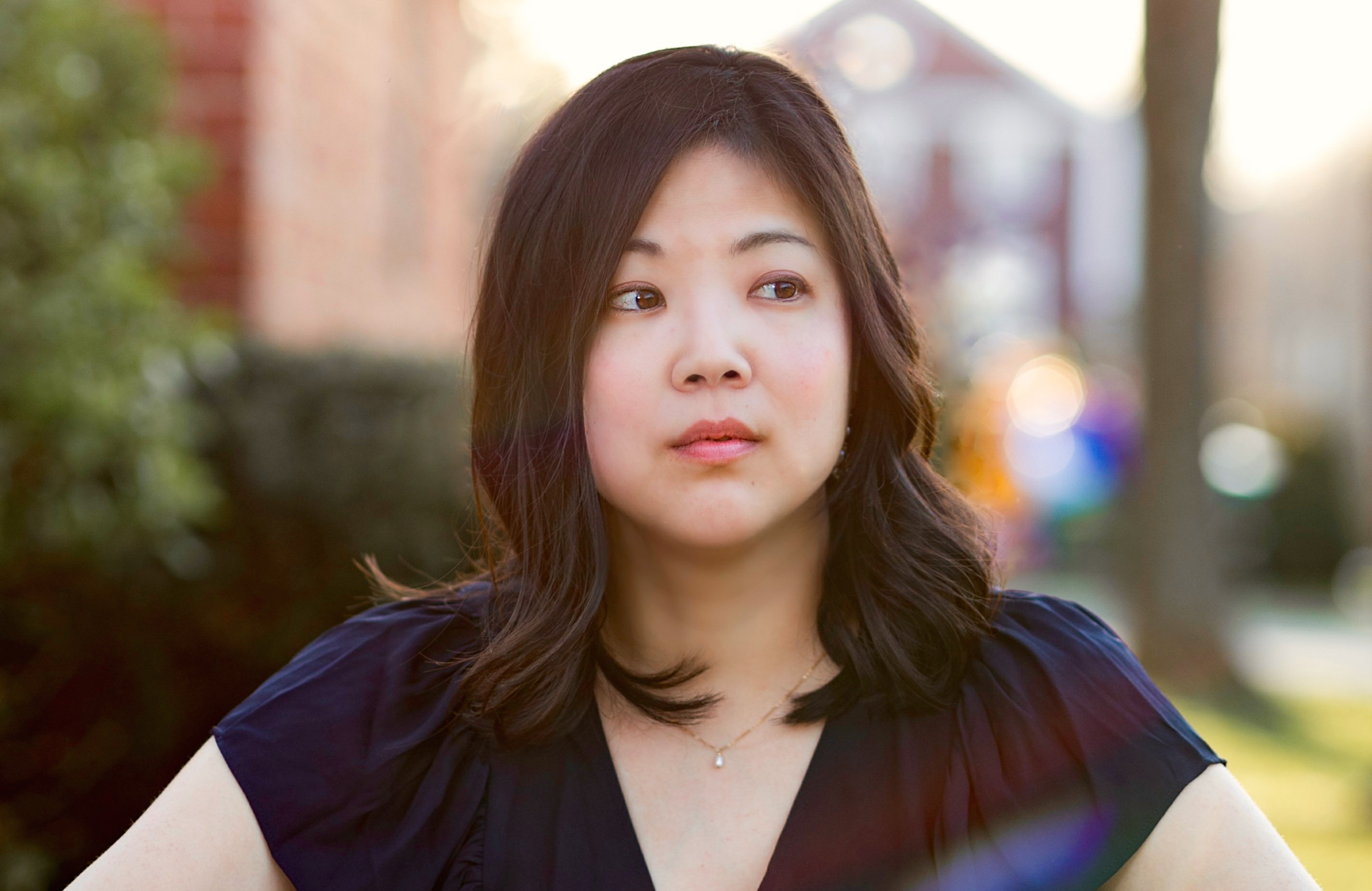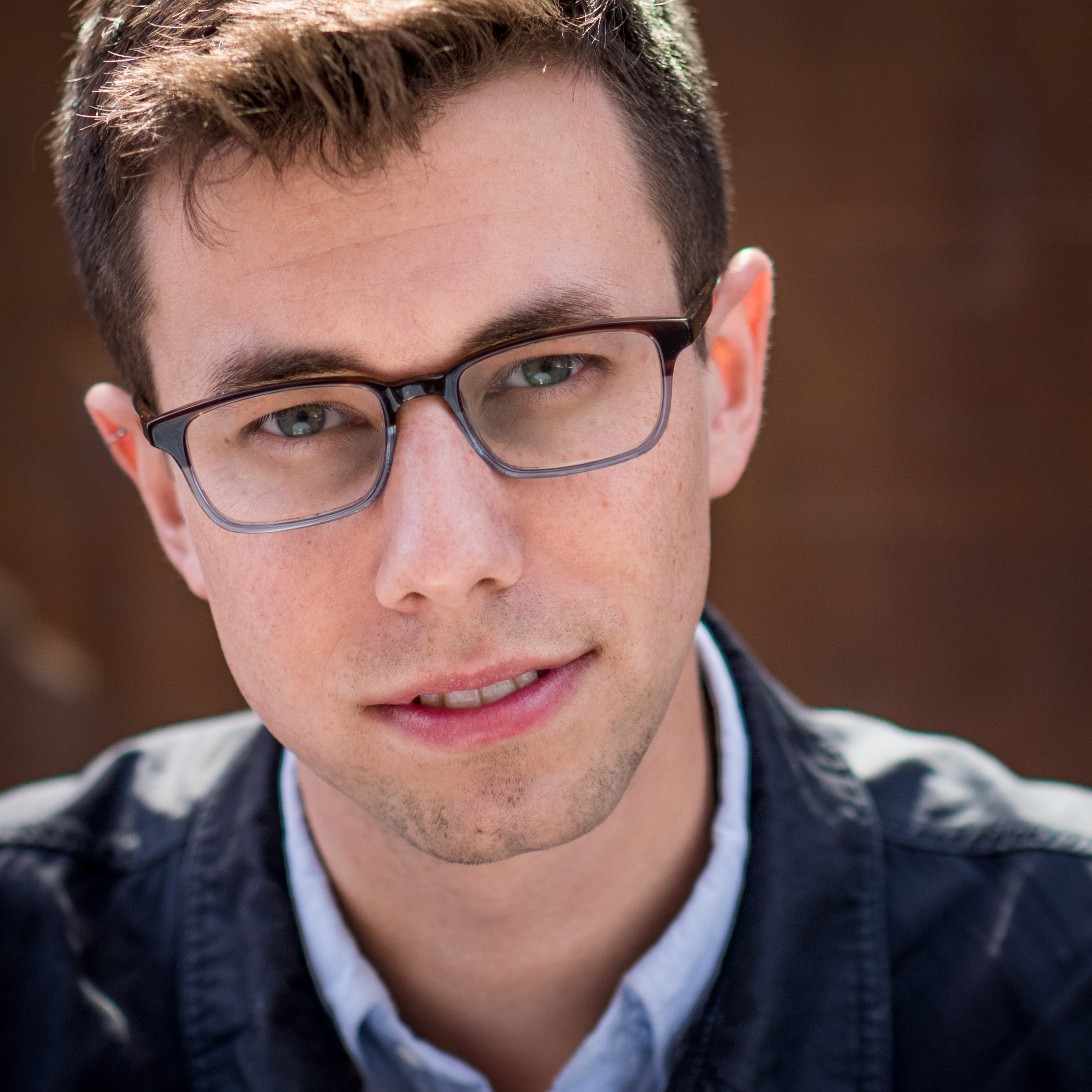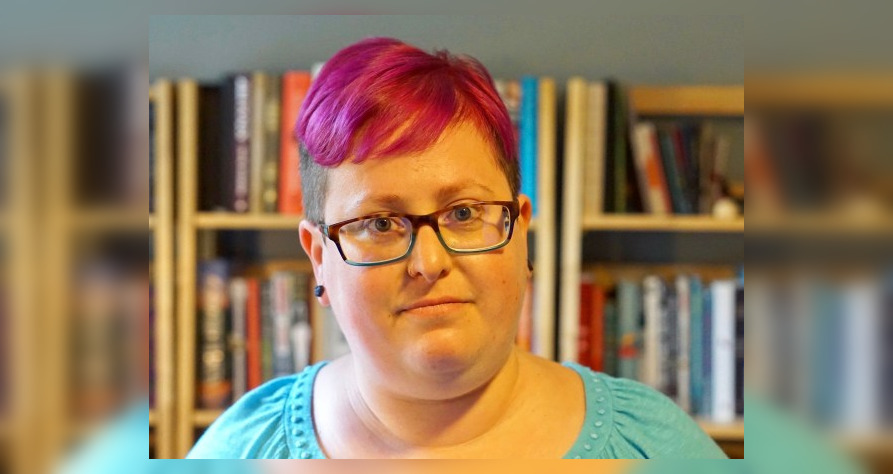In this interview with MFA candidate Sarah Rosenthal, Nicole Chung talks about confronting family lore surrounding her adoption, discovering revision ideas in her dreams, and editing a memoir while grieving. Chung is the author of the forthcoming memoir All You Can Ever Know, and her work has appeared in The New York Times Magazine, Buzzfeed, GQ, Longreads, and Hazlitt.
Sarah: All You Can Ever Know begins with your adoptive mother’s family “legend” about your adoption, as well as a white couple who are considering adopting internationally who ask about your experience as an adoptee. And this memoir, to me, reads as an attempt to rewrite that family legend for yourself and answer these couple’s questions simultaneously. How did you determine where to begin the narrative?
Nicole: Actually, the first sentence that really came to me in this book was the first sentence of the prologue, which was “The story my mother told me about them was always the same.” I love an origin story and I really wanted to begin both by acknowledging this family lore and its power and hold over all of us, not just my mother, but me too, and my father. It was a really simple, straightforward story. Obviously I couldn’t see all the cracks when I was younger.
It took me a while to begin to question, I guess, because it was such a comforting, familiar story, and it did mean a lot to me. So I really wanted to begin with that, and the reason that I began the first actual chapter with that perspective about the couple was because that conversation was one of the first times I remember as an adult reconsidering my adoption, and not really feeling able to say so out loud.
You know, in the book I describe feeling a sort of pressure—and it was from me, basically, it wasn’t them—I really felt this internal pressure as a result of my upbringing and my conditioning just to reaffirm and say “Things will be great, things will be fine.” And a part of me certainly believes that, and another part kept thinking “Should I tell them more? Like, should I go down that path? Would it freak them out to hear about some of the things I did go through that I write about in the book as well?” So I wanted to set up that contrast between what was actually happening to me as a child, what my experience was, and how I learned to talk about adoption, you know, without acknowledging the hard things, the complicated things. And yes, you’re absolutely right, this book is really about facing some of those difficult complications head on and really reclaiming the story.
Sarah: Absolutely. One thing I thought was so exciting about the memoir’s structure is that it’s not just your story, it’s your birth parents’ story and your adoptive family’s story. How did you arrive at the memoir’s structure?
Nicole: That’s such a good question. When I first wrote it, the first draft was much more chronological. I mean, the book hops around in time a lot, which I actually really like, but it took me a while to get there.
The first time I wrote it, it was, you know, there’s childhood kind of in a block, and then coming of age, and thinking more about my birth family, and then this search while I become a mother. And it’s still sort of the structure, but I thought it was important to introduce the idea of the search earlier so we get to that a lot faster. And there’s a lot of cutting back and forth, right, between my upbringing and what was going on in my birth family at the time that I didn’t know about, and then cutting forward to the search.
I mean, I wish I had something profound to say about my breakthrough moment, but truly, I had a dream one night that I was talking to my editor, Julie Buntin, about the book and I was saying “Julie, like, I think I have to restructure the entire book!” [SR and NC laugh]
In my dream, she took it very well, and in real life, when I told her about this dream, she took it very well. She was like, “OK, just don’t delete anything that you already have!” because I already had a full draft at that point, and I spent I forget exactly how long, but I want to say a few weeks, just tearing it apart. I cut a lot of words, and I added a lot of words, and that was really when I started to have this structure where it moves much more in time and it moves a lot faster now. And yeah, it was truly a dream I had about restructuring it and it was kind of funny. I never dream about writing, [except for] the one time.
Sarah: I never dream about writing either, but that’s a very comforting thing to hear as an MFA student, that your dreams can help you edit.
Nicole: I mean, it worked out great! When I first woke up from the dream, I was so mad, I was like, “Oh no, I have to do this now, and it’s going to be so much work! I don’t know if it will work!” But I’m really grateful now that my subconscious sent me that dream because I think it did fix some of the things I was concerned about, and I think it just helps it move a lot faster.
Sarah: I know you wrote a lot of personal essays online for various publications before this memoir came out. I was curious, because as you were saying, it’s very tempting to do chronological [structures] when we talk about memoir. What was it like to, in some ways, transition from personal essays to memoir? Or was that a transition for you as a writer?
Nicole: Well, let me back up. I write essays, and also I do a lot of interviews and just pieces that aren’t necessarily personal, and I like to mix it up because spending too long in my own head I always find challenging. After I write a deeply personal essay, what I really want more than anything is to write about anything but myself, so the idea of writing a book like a memoir was very daunting, because I was like, “That’s just a long time to spend with me!” [NC and SR laugh] I was little anxious about just the sheer breadth of the project, and what that would mean.
I’ve never written at this length before, it’s my first book, and I think you don’t know that you can really write a book til you write it! I mean, you promise that you can write it, and you really hope you can deliver it, but until I really sat down and started working on it, I wasn’t sure. If anything, I overwrote it and then cut it back.
So yeah, it wasn’t even the word count that was daunting, it was like, can I sustain this story? Will there be a clear narrative arc that people can follow over that many words? Over this many years? And over this many characters? So it was a transition, definitely, kind of a scary one, but it was really exciting actually, and looking back I honestly did enjoy, like, 90% of the writing process on this, which feels like a gift, y’know? That doesn’t always happen.
Sarah: Absolutely. And you’ve acknowledged in your essay “Rewriting Adoption” on Catapult, which was an introduction to the “Adopted” [essay] series, that you didn’t have any stories about growing up adopted, especially being in a transracial adoption. So I was curious what books or authors you looked to as influences while writing All You Can Ever Know?
Nicole: Oh, that’s such a good question. Gosh, and I really feel like I should have a solid answer for you. I was asked this yesterday about my influences but it was in a more tongue-in-cheek kind of way. I think I said everyone who’s ever told me a story I loved, which is so many people.
I don’t know that there’s a particular author who has inspired me voice-wise, so I think my voice is kind of just mine, for better or for worse. And I truly didn’t have examples of a lot of adoption stories, I didn’t have a lot of Asian American books and memoirs to read. I mean, there still aren’t that many. This is the problem with being, I don’t know, not one of the first, that’s not the right way to state it, but in rare company? And it was really hard to find those guiding voices and those stories. Part of the reason I wanted to write this is because I didn’t have those. But when it came to this book, I think what was kind of frightening was there weren’t a lot of, like—there wasn’t really a precedent, there wasn’t a lot of stories I could look to that would help me figure out how to write an adoption story like this.
Sarah: No! Please don’t apologize. But also it is a really unique book. I know I’ve never read a memoir like it, and I loved that about it. But also, I thought there were unique aspects, like the fact that you had chosen not only to tell your story, but [your birth sister] Cindy’s parallel story of her childhood, which I found so effective as a reader.
Nicole: Thank you.
Sarah: Was that something you set out to do from the beginning to include [her story], or did that come later? And was that something you ever discussed with Cindy?
Nicole: Oh, for sure. I mean we had talked about it, even before I thought I’d write a book, before I published an essay that mentioned her I would always check in. And she was the first person I sent this manuscript to after my editor.
I really wanted her to have a chance to, I mean, not just to know, but I wanted to know what she thought. I also wanted to make sure that what I included was OK. And we had talked while I was writing and we had talked when the book first sold. I definitely didn’t want to include anything that she wasn’t ok with me sharing. So yes, she was always willing to be a big part of the book. Discovering her and forging this relationship and this bond, I mean, not to give everything away, but a lot of that is really at the heart of the book, and it was a surprise for me when I was searching, but a wonderful one, so I knew it would be in there.
I had not intended to sort of tell our childhood stories in parallel, because at first you get a lot more about me than you do about her, because it’s my memoir and I wasn’t there for her whole childhood, but I did talk with her a lot to find out a little bit of what she remembered of, for instance, after I was born, what she was told or not told. I wanted to, without giving away, again, huge chunks of the book, I wanted to know what her childhood was like, and also when she came of age and moved away from home what that experience was like. Also, I really wanted to tell the story of our reunion from both perspectives because she had a very big shock, so I knew that that was going to be an important thing to convey and acknowledge and also kind of a good source of narrative tension, to be really frank.
But yeah, she has an amazing story, and she’s just a wonderful person, and I really wanted her to be a part of this. I lucked out in that, you know, every time I asked “Is it OK to write about this?” she said yes. She certainly didn’t have to. And I certainly wouldn’t have if she didn’t want me to. So yeah, I was really really happy with how her story turned out and one of the best things about the book for me is then hearing that she feels that it’s accurate and that she feels honored by it. I really wanted her to feel not just OK with it being out there but I guess proud, and honored by it, because it is so much a tribute to her.
Sarah: I really was so moved by how you honored all members of this family, and I was especially moved when I read that your adoptive father passed away right after the book’s manuscript was completed. You wrote about it in your Longreads essay, “How to Write a Memoir While Grieving.” So much of this memoir is already about the loss that’s inherent in transracial adoption, especially familial and cultural losses, so I was curious how that experience has shaped this book’s publication, if it has at all, and if it’s changed the way in which you view the book.
Nicole: It’s just changed my whole life. My father died in January and it was just unexpected. I mean, he hadn’t been well, but it was very much not like we thought it was imminent.
Sarah: And I’m very sorry for your loss.
Nicole: Yeah, he was 67, and it was not when I expected to lose him. And in any other year, this book would be the biggest thing that happened to me, but of course, it’s the second biggest thing to happened to me this year. So it’s been really difficult. I’ll be really honest, it’s been hard finding time and energy for grief, and hard finding time and energy for the book, there’s so much that you have to do to get a book out there. And the manuscript was basically due like, the day after I found out, and I could have gotten an extension but at that point I was so close to being done and still kind of numb and in shock, and I was like “Well, if I don’t do this now, what if I fall apart and can’t do this later?” So I sat there the day after I found out he was gone and I was working on this book. I remember emailing it to my editor at like 5:00 and being like, “OK, I’m done for the next couple of weeks.” [NC chuckles] And then I flew out to Oregon for the funeral.
So it’s definitely effected how I view the book. It’s hard now to read sections my dad is in, but at the same time I’m really glad that part of him will live on in this book, which sounds so cheesy, but it’s true. I’m adopted, so his genes aren’t living on in me, and I can’t really see him when I look in the mirror or when I look at my children, but I see him in this book, you know? I think his love for me is really clear in the pages, which is not to minimize the complications of a transracial adoption like mine. But yeah, I’ve just been really grateful that he’s a part of this book, and that he got to read at least some of it and he really, really loved what he read.
Sarah: Yeah, I think that’s something so powerful for nonfiction writers, that not only do we live on as you were saying, through genes, but also we help honor people, and help people live on through our writing. I think that’s something that for me never gets talked about in workshop settings, which is that we actually get to help people live on in different ways, not just biologically.
Nicole: Yeah, I had not thought about that, honestly, really, until my dad died. And I’ve been thinking about it a lot since, obviously. Yeah. I mean, I wish he was here to see this. I mean I wish he was here for lots of reasons. My book is not the reason I wish he was here. But I think he would have enjoyed it. I think he would have been really proud, and he would’ve gotten a kick out of it.
Sarah: I have one more question for you. What advice would you give to an aspiring memoir writer?
Nicole: Oh gosh. Another question I should have much better answers for!
Well, there’s craft things, like structure is the hardest part for, not just me, but for most of us, just figuring out the shape a book will take. And what to keep in and what to take out is difficult, so don’t be afraid to write or even overwrite and you can always trim back or remove things later. Like I said, I tore my book apart after finishing a full draft and honestly, at the time it was a pain, but it was a really interesting process, and I learned a lot about my work and about revision.
I think it’s so important like with any book to find an editor who you gel with, and who you trust absolutely, and who is, if possible, even more excited about the project then you are, and I definitely had that in my editor. So if you can find an editor like that it’s so important, especially with memoir, it’s just you’re digging down so deep and telling such a personal story, so you really need an editorial relationship that’s based on a lot of trust and honesty.
What else? I think one of the biggest things I learned is that when you write a memoir you have to be prepared for people to you know, read it and take from it and enjoy it, hopefully. But they will also maybe get things from it that you didn’t fully intend, because the book is so personal, it’s your memory, it’s part of your life, not your whole life story but part of your life on the page, and at the same time, it has a life of it’s own once it leaves you. You can’t control, and I think we shouldn’t want to control, how readers interpret it, or how they feel about it. I mean it’s natural to want your work to be liked or read generously. But people have said things to me about the book that almost surprised me, even though I wrote it and have read it more times than, like, anyone. Maybe more than I cared to. And I thought I knew everything about it. But people have pointed out things that maybe I didn’t hone in on as, like, the most important part, but it was the most important thing to them.
A very personal piece of literature will have its own life, you know, beyond you, and beyond your heart and your mind and your family. And you have to be at peace with that. You have to feel OK with that, because you don’t control how a book goes out into the world. That’s something I think memoirists have to be prepared for. I think sometimes we imagine that it’s my life, it’s my story, if I can just tell it in the right way—maybe it’s just me because I’m a control freak—I can control what people get from it, and make them see my mind. And maybe they’ll see that, or maybe they’ll see something completely different. And still, it’s a privilege to have your work out there and to have it be read.
Photo Courtesy of the Author




